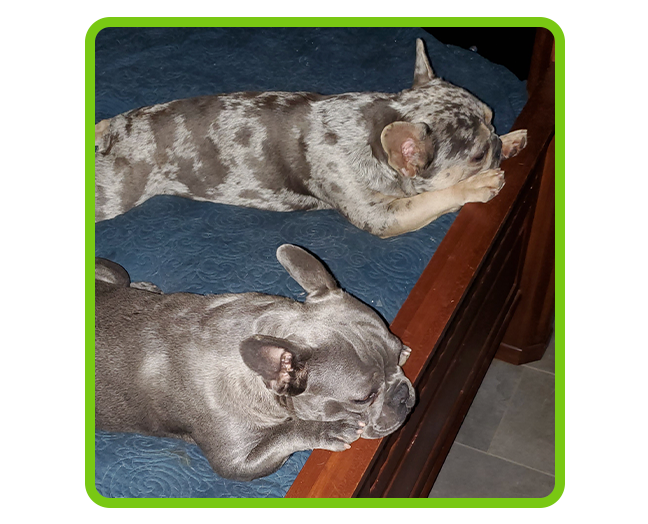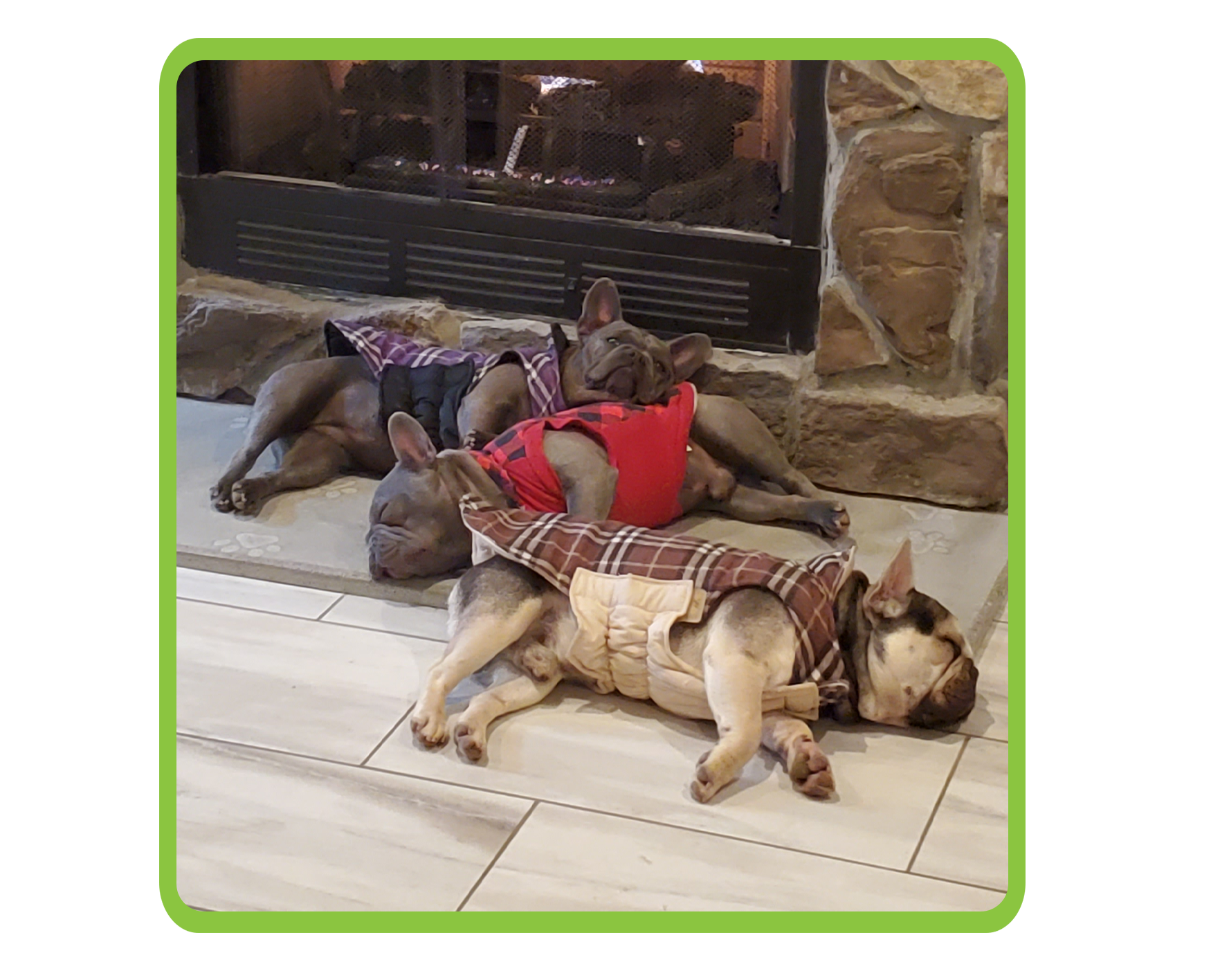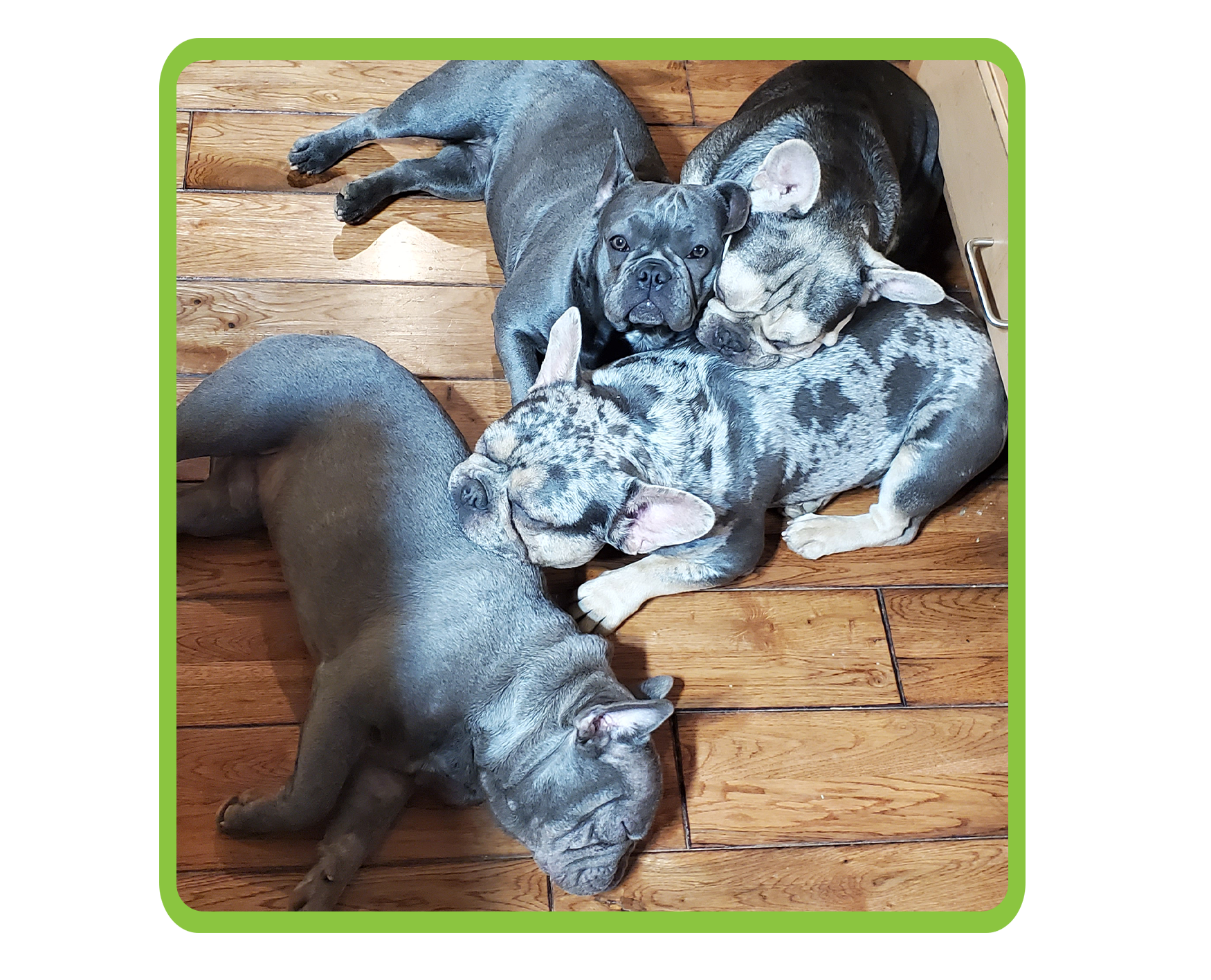Q: What are your puppy prices?
FALL 2025 PRICING:
Standard Coat Females are $3500
Standard Coat Males are $4800
Long-Haired/Fluffy Coats are $6000
Q: What is included with the puppy price?
Your puppy will have all age-appropriate shots, dewormings, a microchip, his/her health record summary, Embark, UC Davis or Animal Genetics DNA Coat Color Analysis Report, and an 18-month Health Guarantee. Pre-paid AKC registration, an AKC Litter Certificate and a welcome basket with a bag of starter puppy kibble and toys are also included with your new puppy.
Q: Why are french bulldogs so expensive?
A lot of care and expense goes into raising the dams/sires and the puppies. All adult dogs are health tested and genetic coat color tested. All puppies are also coat color tested. The dams have narrow hips and need to be bred artificially and have cesareans which is not inexpensive. If a dam goes into labor on a Saturday or Sunday, the c-section bill just jumped from $1,500 at our regular vet's office to over $5,000 at the emergency vet! The cost of quality kibble and organ meat, turkey, beef and nutritional supplements are a substantial expense. We go through a 40 pound bag of kibble a week! Factor in the expense of microchipping, de-wormings, flea/tick medications, heartworm meds, vaccines, ear cleanings, anti-fungal wipes for their facial skin creases, pre and post natal vitamins, progesterone testing, pregnancy x-rays, etc. Regular vet visits at least every 6 months for all our adult dogs adds up as well.
Q: What payment methods do you accept?
Venmo, CashApp, Zelle, Paypal or Cash are accepted for initial $500 puppy deposits. The balance may be paid by any of these methods while face-to-face in person when the puppy is picked up. Personal loans from companies such as credible.com is an additional option for those who are interested in financing. They work with over a dozen lenders and you can customize lenders according to your credit score range. Approval is quick and you can have funds within a day or two. (We are not affiliated with Credible.com and do not receive a referral fee of any sorts. We are just trying to give customers the most options available). If the puppy will be shipped, the entire balance must be paid before final flight arrangements are made.
Q: What coat colors do you produce? What are fluffies?
Fawn, lilac, lilac and tan, black and tan, blue, pied, merle, brindle or any combination thereof (and some may carry or visually display the long-hair/fluffy gene). If you have spent time doing research into this breed of dog, you will find that breeders of French Bulldogs fall in 2 categories: those that believe only AKC sanctioned and approved coat colors should be produced and those breeders who believe that all french bulldog coat colors are beautiful. We love ALL french bulldogs and find beauty in ALL the coat colors.
The AKC has recently expanded their approved coat color standards after over 120 years. Pups that are blue, blue and tan, black, black and tan, chocolate, chocolate and tan and blue fawn are now welcomed in the AKC. A puppy that has a coat color outside the range of the approximately 10 colors currently acknowledged by the AKC can still be registered with the AKC, but the dog cannot be shown in a AKC sanctioned competition (as it is considered a disqualifying color). If you have no intention of showing your dog in a competition circuit, a dog with one of the various other coat color combinations that are produced today by breeders will still be an excellent companion.
What about the long-hair/fluffy variety? We have a few "fluffy" dogs in our frenchie brigade. Unfamiliar with fluffies? I have a book that has an original copyright date of 1933 that was written in French by a man who was the president of a French Bulldog club in Europe at the time. In it (to my knowledge) is the first photographical evidence of a long-haired french bulldog. At that time they were called Angora French Bulldogs.
The controversy surrounding long-haired french bulldogs stems from the thought that the gene that causes long-haired coats did not originate naturally in the french bulldog line. It may have been introduced by another breed of dogs that displayed a long-hair coat. Seeing as how I was not around in the early 1930's in Europe, I cannot attest to this. However, with the advancement of modern genetic testing available to breeders over the past 10+ years, it is now possible for us to isolate the gene that displays a long-haired coat and pair up a sire and dam to produce offspring with this coat. A frenchie who is either a fluffy carrier or visually displays the fluffy coat is wonderful to pet, as their coats are very soft.
Irregardless of the controversy, after approximately 6 generations of breeding, the dna Embark report of a fluffy french bulldog now displays that as being a genuine french bulldog. You, however, may love or dislike the coat of a fluffy frenchie. Having owned both standard and long-haired coats, I love them both. Our 2 year old long-haired frenchie (Berlyn) has one of the sweetest, most gentle souls I've ever encountered. At the end of the day, the temperament of a dog is what matters most to us, not what happened almost 100 years ago and how the dog may have come to be.
Q: I’ve read some conflicting information about merles. What’s the deal?
If you are interested in a merle frenchie, you may have read articles stating that merles are unhealthy or will be plagued with problems. We have a merle male and I can say from experience that this is not true. He is no less healthy than any of the other frenchies we have. If the dog was bred poorly and both parents carried the merle gene and the dog is double merle, then this blanket statement of merles being unhealthy applies. A reputable breeder would never breed a dam and sire that both carry the merle gene. The inherent risks are blindness or deafness. It is important to select a breeder that performs genetic tests on their dams and sires to prevent this from happening.
The controversy surrounding merles comes down to coat color. The merle coat pattern is not an original french bulldog color. It is believed that sometime in the 20th century a standard coat french bulldog was bred to a dog with a merle coat - perhaps a Chihuahua. This introduced the merle coat pattern to the french bulldogs. According to ethicalfrenchie.com, the "AKC only considers merle french bulldogs to be purebred frenchies after the sixth generation merle". If in fact a frenchie had a rendezvous with a chihuahua which thereby gave us the beautiful merle coat pattern, it happened decades ago and has exceeded the sixth generation timeline. The choice is yours to decide whether or not the history of the merle coat pattern bothers you. I, for one, think my merle boy is wonderful in every way!
Q: Can I see your dogs?
When we have puppies, we allow interested parties to physically visit the puppies after 6 weeks of age. We request that visitors wear protective booties over their shoes, wash their hands and then wear medical gloves to handle the puppies if the puppies are under 9 weeks of age and have not yet had all their shots. These methods are in place to safeguard the pups from infection or parasitic organisms that can attach themselves to the bottom of shoes from the grass. We have an open-door policy when it comes to the adult dogs. If you want to meet any of our adult dogs and you are in the East Tennessee area, by all means stop by! We can always conduct a video call and give a virtual tour of our facilities as well.
Q: Are your puppies hand raised?
Yes, our puppies are hand raised inside our home and under constant love and care.
Q: Why are some dogs in kennels?
We alternate adult dogs into the house on a weekly basis. We give our girls a week inside the house and then the following week the boys are inside the house. This way the boys are not fighting over the girls or marking their territory and everyone is comfortable in their own space. The exception to this is when one of our dams has puppies. At that time she is given her own room away from the other dogs inside the home so that she feels secure to nurse her puppies. When all our dogs were growing up, they would run around together inside the home and all the dogs slept inside their own individual crates in the bedroom with us at night (it was crowded)! However, once hormones kicked in and the dogs reached sexual maturity, we found it best to keep males and females separated. That is especially true now that the pack has grown (we're up to 16 frenchies). Since we built them temperature-controlled kennels with plenty of space to play outside, we found that the weekly transition is easy and the set-up has not changed their personalities or impacted how they interact with us. Of course, all dogs receive regular walks and exercise above and beyond the time they spend in the kennels or the house with us.
Q: Are your dogs health tested?
Yes. All of our adult dogs have been health screened for genetic illnesses common to the French Bulldog breed.
Q: What is your health guarantee?
We offer a lifetime guarantee against fatal genetic diseases on all our puppies and a 24-month general health guarantee. We believe in taking responsibility for all puppies we create. If one of our puppies is diagnosed by 2 or more independent vets as having a congenital defect leading to its inevitable demise, we will buy-back the dog OR give the buyer a replacement puppy of their choice.
Q: How do I know the puppy coat color is the color you say it is?
All the puppies are dna coat color tested by Embark, UC Davis or Animal Genetics. You are provided a copy of the report with your puppy welcome package.
Q: Are your puppies AKC registered?
Yes, all puppies include pet AKC registration. Full registration may be available for an additional fee.
We sell AKC licensed and registered french bulldogs, so our facilities are subject to random AKC inspections. We did not cut corners when planning our kennel and puppy nursery designs. The comfort of our dogs has and will always be our priority. We welcome any State, County or AKC inspections. Currently, our State of residence (Tennessee) does not require a dog breeding license, but if rules change in the future, we will obtain whatever license is needed.
Q: Are your dogs under the care of a vet?
Yes. We have an amazing vet that specializes in bulldogs who sees our dogs frequently. We will gladly give you the vet clinic’s name and you can call them to confirm that all 16 of our dogs are regularly seen there.
Q: What do you feed your dogs?
Effective 2024, our dogs are fed Next Level Hi-Pro 30 LS (all life stages) kibble with an organic topper. We boil filtered water and soak the kibble for 15 minutes. Then we add any additional age-appropriate supplements / vitamins. For a topper, our dogs are fed pure pumpkin, fresh boiled sweet potatoes, cottage cheese, or cooked organ meat, chicken or beef.
Q: What does your Stud service include?
If you are utilizing Progesterone testing and can give us 48 hours notice Monday-Friday, we can have our vet extract the semen from the dog of your choice, have the sample tested for viability and FedEx or UPS overnight shipped to you in time for inseminating. We ship the sample using a semen extender and ShipMate, which utilizes electronic temperature control. A pipette is also included for your convenience.
Q: Do you ship puppies?
Yes. We offer in-cabin flight service for domestic US flights. Whenever possible, we try to arrange delivery in-person ourselves via automobile to reduce stress on the pup. If you are located a few states away from Tennessee and within a 6 hour drive, most times we will deliver the pups ourselves or offer to meet you half-way if that is an option. We do have a flight nanny available and her fee is $550. We pay for any airline fees to transport the dog and the nanny fee is payable directly to her upon delivery.
Q: Do you accept advance deposits?
We post photos on the website with puppy due dates and pics of the parents. Contact us if you are interested in a puppy from the litter and we will let you know when the puppies are born and you can choose a puppy. Once you have selected a puppy, you can submit a $500 non-refundable, but transferrable deposit to hold your dog of choice.
Q: What do you do to help with the transition to a new home?
Our puppies receive plenty of human and dog interactions, but we also make sure they are exposed to desensitizing sounds. The puppies hear vacuum, washing machine, sirens, fireworks, doorbells, door knocks, hair dryer noises, storm sounds, etc. for an average of 4-6 hours a day from 3 weeks of age on up.
In addition, we begin crate training at 7 weeks of age. All our dogs have been crate trained and we believe crates help provide a safe den-like atmosphere for dogs. Once pups have had all their shots, they are encouraged to use our doggie door to relieve themselves on grass outside and transition from using the pine pellets and litter box set-up we use indoors.
Q: My circumstances have changed and I can’t keep my dog. Can you help me?
If at any time you find that you are no longer able to provide safe housing for your dog, let us know right away. We will gladly take the dog back and use our resources to find a wonderful home for the dog if we are unable to keep the dog ourselves. We would rather take a dog back and care for it indefinitely than see it end up in a shelter.
Q: What do you ask of potential puppy parents?
We request that anyone interested in one of our puppies be willing to commit to the following:
1) Provide stairs or ramps to your sofa or bed at your home and encourage regular use to decrease joint, leg or spinal damage to your new companion.
2) Commit to using a harness for your pup – never a collar. Brachycephalic breeds are susceptible to crushed larnyx/trachea and should never be led around by a collar or retractable leach.
3) Feed your new puppy quality food and supplements indefinitely. Ol’Roy won’t cut it. Dogs need quality kibble and/or a raw BARF (biologically appropriate raw foods) diet to give them the best chance for a long and healthy life.
4) Maintain regular (at least every 6 months) vet visits and keep up with flea/tick treatments, heartworm medication and a general wellness exam.
5) Maintain a healthy weight for your dog and do not overfeed them. Yes – we know. Those big eyes make it seem like they are soo hungry and your human food is incredibly tempting to them. But many ingredients in human food are simply not safe for dogs. For example: Dogs don’t have the ability to process sodium the same way as humans and regular chicken broth (while tasty) is not good for them. Also, something as simple as onions mixed into your dinner that you didn’t finish and put in their bowl can be toxic. A healthy weight also decreases the strain on joints and bones. Since French Bulldogs are low to the ground, a jump from a sofa or bed with added weight on their frame could prove damaging to their structure.
6) Provide a safe back or side yard. These lil guys are incredibly curious! They want to run around and explore their world. Please make sure your property is secure and all fences or gates surrounding your property won’t allow for your lil one to dig their way out or let anyone in. Consider investing in a camera system that monitors your yard when your dog goes out to play or to the bathroom. It might sound excessive, but there are countless stories of dogs being stolen from a side or front yard when an owner is inside the home. An ounce of prevention is worth a pound of cure!




